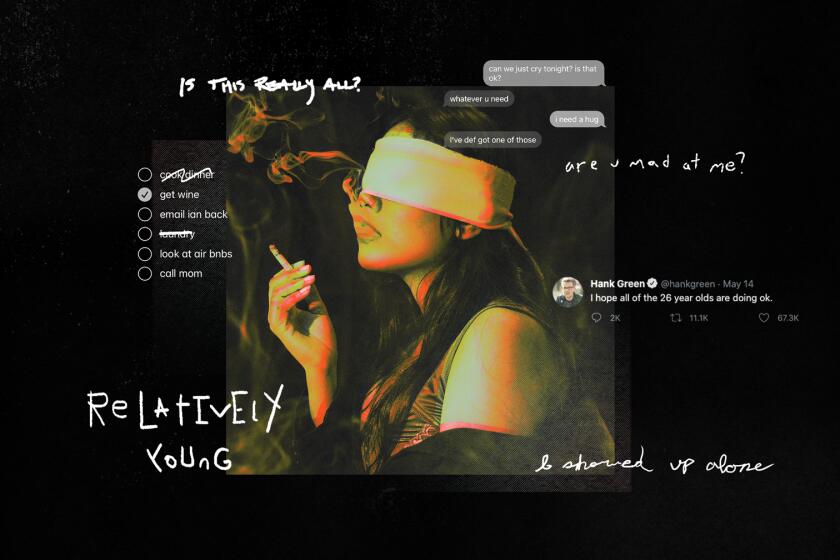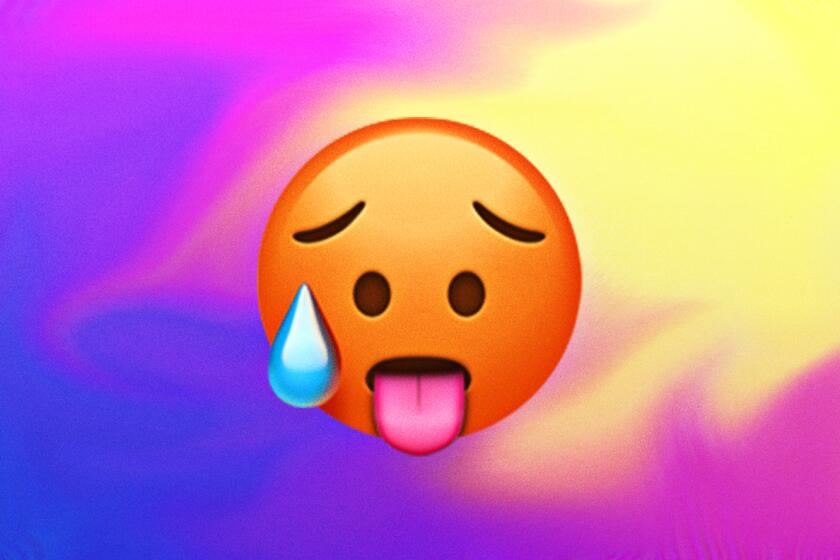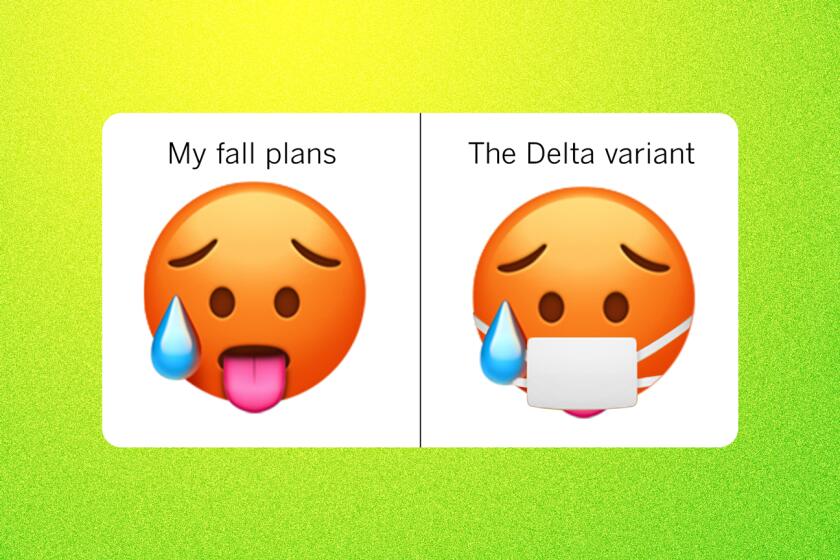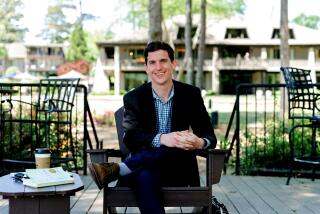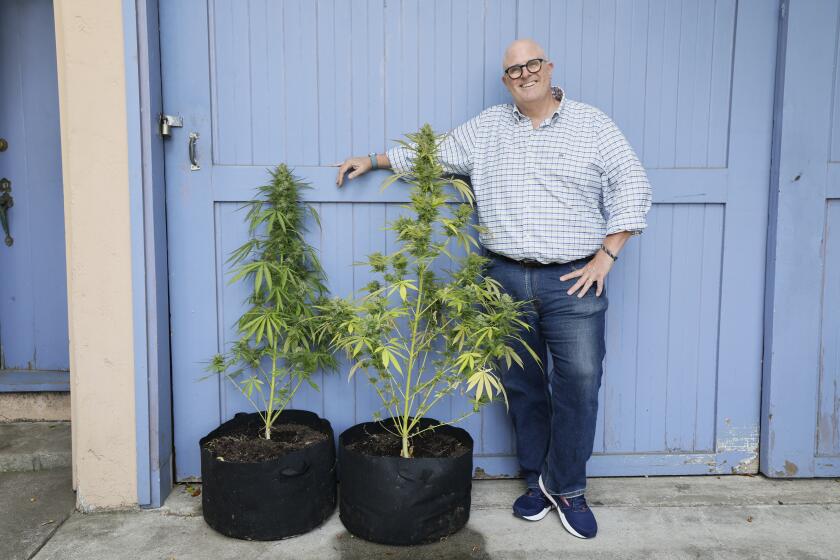Anxious the Delta variant will pause life again? This therapist can help you cope
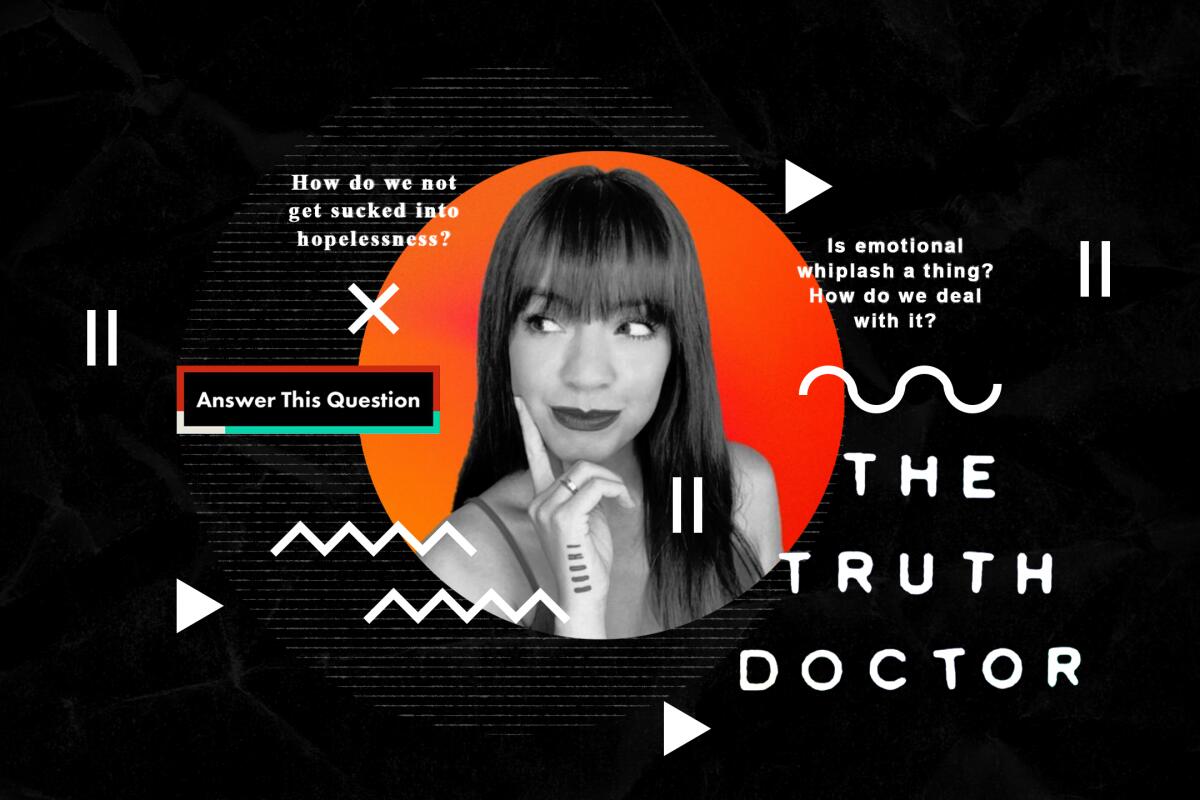
The tail end of summer 2021 has in many ways taken on the chaotic vibes of early 2020, when we had a sense that COVID-19 would change our lives drastically but we didn’t know how, when or for how long. That familiar stomach lurch, the confusion, panic and uncertainty — the WTF of it all — is back with a vengeance thanks to the highly transmittable Delta variant.
And now, some would say, it’s even worse.
26-year-olds are sharing the pains of their age: “Society is like, ‘You’re not thinking about having kids or getting married? What’s your aspiration, what’s your goal?’”
For months we were barreling back toward a life that felt at least vaguely familiar, full speed ahead into our new ideal of freedom. Now we’re pressing pause again, praying to the pandemic gods that another full stop isn’t on the horizon.
Over the last year and a half, doctor of clinical psychology and licensed clinical social worker Courtney Tracy has emerged as one of the leading voices in a thriving community of TikTok therapists giving advice on everything from dealing with intrusive thoughts to navigating the emotional fallout of COVID-19. (She’s also one of the most satisfying to watch: After all, who doesn’t love seeing their therapist drop an F-bomb from time to time or dance to Soulja Boy?)
Posting under the handle @the.truth.doctor, the SoCal native has built a community of more than 1.6 million followers on the app with a refreshing willingness to get personal — citing her own experiences with severe anxiety, drug use and borderline personality disorder when giving advice to her followers.
The heightened fears and anxieties rising around Delta can be attributed to the fact that it’s often harder to lose something twice, Tracy explains. “There’s this period of processing that’s necessary,” she says. “I think that there was this sense of hope in the last couple months that we were going to have time to process. Now, not only are we back in grief but we’ve also lost hope.”
She sat down with The Times to help us wade through the emotional murkiness of this new wave in the pandemic and to answer the question on all of our minds: How do we cope with the fear that life will once again pause at any moment?
How do we begin to acknowledge our emotions around the Delta variant?
It is, and has been, and likely will continue to be, extremely f— overwhelming. The main reason for that is because as a human species, our brain tries to have stability. We do it internally with homeostasis, trying to stabilize our systems — which are never perfectly stable — and externally, we try to manage it with what’s going to happen next, how much is the future similar to the past and how am I going to survive. Through this pandemic, we’ve lost the ability to stabilize. What’s hitting us the hardest during this Delta variant time period is that it’s sometimes harder to lose something a second time.
For a while we thought we were in the clear; now things have changed. Is emotional whiplash a thing? How do we deal with it?
It’s totally a thing. I worked in addiction for eight years and one of the most powerful phrases is knowing the difference between what you can and cannot control — and accepting that. There isn’t really a way to get through this time period other than generally accepting that we are mortal, and that we exist on a planet that is uncertain and unprecedented things happen. When we push away things that we wish were not happening, oftentimes we’re also pushing away the emotions attached to those things. As we accept what’s happening, we also open up the door to experience what we’re feeling about it, and that not only makes us move more in the direction towards healing, but it also can prevent being traumatized.
The emoji of our eternal pandemic, vaxxed, variant summer is the hot face.
How do we become OK with not being in control?
We do things all day every day that we think are in our control, but they’re actually not. So I think part of it is realizing that we’re more capable of accepting things that are out of our control and living and working with them than we ever really realized. Once we come to realize that we can actually live with things out of our control, we get our sense of agency back.
The emergence of the Delta variant is retriggering a lot of the losses we felt in 2020. What’s the best way to process that?
Having double grief is definitely harder. There’s this period of processing that’s necessary, and I think that there was this sense of hope in the last couple months that we were going to have time to process. Now, not only are we back in grief, but we’ve also lost hope. It starts with acknowledging that we’re in it and then learning what those stages of grief are — that’s what’s going to normalize anyone’s response to what’s happening.
We deal with mixed messages all the time — say, with mixed messages in relationships. How do we deal with pandemic-related mixed messages?
The way that I like describe our relationship to society and the government is like they’re our parents. And we are in a [messed] up relationship with our parents. We absolutely are getting mixed messages. We don’t know which direction they’re going to step for us to know which direction we are going to step. Do we need to walk on eggshells or can we be fully open and transparent? Can we trust? When we’re dating someone and we’re getting mixed messages, what usually makes us decide that we’re not interested in that relationship is that we’re not gaining any sense of support, sense of love and a sense of being seen and understood. What’s hard, though, is that we can leave that relationship — and with our actual parents, we could stop talking to them if we wanted to — but we can’t leave the pandemic.
How do we continue living even though life feels like it’s hanging in the balance?
Well, if we’re stuck in a trauma response, it’s really hard. But there are really small things that we can do. Humans are motivated by these hits of dopamine, usually through interpersonal relationships, through achievement at work, through nice dinners at restaurants and hugging the people that we love. When we don’t have access to all of those things, we often lose motivation. We have to combat that simply by getting up and moving our body.
How do we fight the urge to do everything “while we still can” and burning ourselves out?
To me it sounds like that is a scarcity mindset. And I think it really sells ourselves short. When we do that, we are living in the distrust of the world around us — and while we need to be vigilant about what’s occurring around us in our external environment, we also need to find ways to trust that things will get better and to build that hope. … We need to have some sense of hope.
But how do we build hope when the future feels so uncertain?
I think that it starts with finding avenues of good things that are still happening in the world.
Meme trend analysis: “My fall plans” vs. “The Delta variant”
I always say, “Close your eyes and imagine that all these things are happening right now in this very second: There is a deer smelling a flower, there is a baby being born, there’s people saying ‘I love you’ for the first time, there’s people getting married, there’s people deciding who they truly are in their identity and feeling freer than ever.” We can shift our perspective away from this scarcity — this fear-ridden, anxiety-provoking mindset of, “We are in a global pandemic and it’s never going to go away.” We are in a global pandemic, and there’s still a lot of goodness going on in the world.
So how do we cope with the fear that life will once again pause at any moment?
Realize that we’re not experiencing this alone. That is a really important starting point, in addition to many other things that people can do. The first thing is having a daily routine. We are living in uncertainty and instability since this pandemic is so open-ended — a daily routine helps ease our anxiety and makes us feel like we’re more in control of our survival. Daily exercise is also really important — and for people who are physically disabled, breathing can help, eye movement can help. The reason for that is any fear, anxiety, anger — any emotion that we experience — is stored in the body just as much as in the mind. Lessening watching TV on COVID [is important] too, because as long as you know your precautions and what you need to do, there’s no need to watch the numbers rising. We do not use to put ourselves through that again. Then staying connected. I talk a lot about existential crises, and the reason people find themselves in existential crises because we don’t talk enough about our mortality. I think we need to acknowledge that we are alive, we exist, and part of that is so that we can connect with other humans.
More to Read
Sign up for The Wild
We’ll help you find the best places to hike, bike and run, as well as the perfect silent spots for meditation and yoga.
You may occasionally receive promotional content from the Los Angeles Times.
